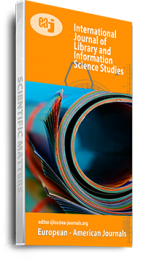The aim of this study was to investigate the development and validation of circulation software package for university libraries in Federal Universities of North Central Zone, Nigeria.. Specifically, five purposes and three research questions guided the study. Related literature was reviewed under conceptual framework, theoretical framework and related empirical studies. The study adopted descriptive survey at first after which it will adopt Research and Development (R&D). The study was carried out in North Central Zone, it has population of 155 comprising librarians and other library personnel who have worked in circulation department from seven federal university libraries in the zone. The study used purposive sampling technique to sample 108 librarians and other library personnel. From the above population one hundred and eight (108) questionnaires were distributed filled and returned; representing a return rate of 70%. The data collected were analysed using descriptive statistics of frequency tables and mean scores. And the decision rule for research questions one through three was based on whether the mean score value was lower than or equal to and above the criterion mean value of 2.50 for either rejection or acceptance. The findings of the study shows: that federal university libraries under study to high extent employ manual procedures in carrying out basic circulation functions such as registering users at the circulation Desk, charging out items to users at circulation Desk, Discharging and renewing items to users at the circulation desk. The study revealed that majority of the respondents strongly agreed and agreed that Fast report generation is not possible, Tracing a book on the library shelf is difficult, Information about issue/return of the books are not properly maintained, No central database can be created as information is not available in database, Difficulty in determining if a patron has overdue, the manual charging was characterized by long queues and unnecessary delays, manual card systems basically provide just one access point, the due date is on a card that has been lost, It is possible to have two (or more!) cards for each item, Waste the users time, The process is cumbersome and Inefficiency in service delivery. Finally, the finding also shows that majority of the respondents have little or no skill in Software design, Software installation/operations, Web design, Digitization and imaging technology, Online cataloguing(MARC) and OCR Devices classification (NLM). It also revealed that respondents have low skill in automated circulation system and System analysis and design. However, the table indicated that most of the respondents have a very high skill in MSOffice, Database searching technique and Transformation of data. Recommendations were made as follows; Libraries should encourage the production of local library application software by patronizing them and even be part of the software development, there is need for constant training and re-training of staff in the proper handling of Information and Communication Technology equipment and process so as not to run in to trouble, staff such as programmers, analysts, and operators should be employed to handle the computer system and train the librarians on basic trouble shooting, ICT facilities and other equipment should be made available for staff at the circulation desk, white the outdated ones should be replaced and each university library should have a stand-by generator and UPS to guard against power failure and its damage of the automation equipment. The project development of library circulation Software package that was developed based on the findings of initial descriptive survey carried out to manage the daily book transaction and manage the member, books record more efficiently to improve management of the book property in the library. This library circulation Software package is mainly use by librarian, library admin and users. Besides that, library circulation Software package also allows user to search for availability of books by Title, Author and ISBN via World Wide Web. The methodology adopted to develop this system is waterfall model. Thus, the work chapters included system planning, requirement analysis, system design, programming, system and testing, of the project. The software is available on-line via http// www.libcsp.com
Keywords: Circulation Software Package, Development, Federal Universities, Libraries, Nigeria, Validation

